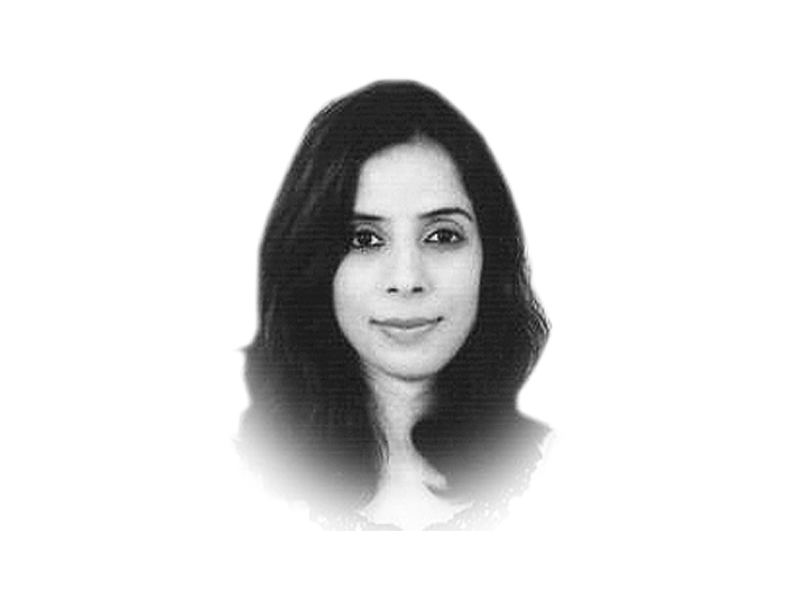
Pakistan’s Constitution guarantees the right to education, yet millions in our country still don’t go to schools. We have more restaurants and boutiques on MM Alam Road in Lahore than schools. Our political leaders have the time and luxury to dine out in a newly-opened restaurant or shop at a designer’s outlet but do not have enough funds to set up a strong and cohesive public education system. They spend millions on their political meetings and functions, perhaps, more than that if somebody from Turkey or China is coming to visit them, but will not give relief to an old person lying on a plank in Mayo Hospital, breathing his last. I recently read that the outgoing government in Punjab had promised to issue health insurance cards to the poor; did the outgoing government really mean it, or was it just a stunt?
The people of Pakistan are sick of broken promises; they want to rebuild Pakistan, Jinnah’s Pakistan, where peace and equality prevails. As elections approach, we are all hoping for change, a positive change. The country is in dire need of a leadership that can transform the people’s lives, reform the current system and eradicate corruption from all strata of society. The eyes of Pakistanis, especially the youth, are set on Imran Khan’s Pakistan Tehreek-e-Insaaf, a party that seems to be the country’s only harbinger of hope.
Pakistan was not made only for its powerful elite, for the corrupt leaders or officials, who have sucked up all its resources and money and accumulated wealth for their future generations. Those who have exploited and abused the country’s resources must be held accountable and must be summoned to the courts. Why is it that some citizens became rich over night? How do they manage to afford Mercedes X Class and huge villas when their previous generations were living on meagre means? It is disturbing indeed, but unfortunately, that is the reality. It can be fixed only if we do away with corruption in our society that is destroying its very fabric.
We should not ignore the poor in Pakistan, who are coping with the vicissitudes of daily life; let us give them a chance to live a decent life. Pakistan’s dilemma is that our leaders sign international human rights treaties and other conventions and that remains the highlight for them; they fail miserably when it comes to their implementation and putting the letter and spirit of such treaties into practice. We have signed the Convention Against the Elimination of Discrimination Against Women, yet discriminatory practices are continuously on the rise; we are a signatory to the United Nations Convention Against Corruption, notwithstanding that Pakistan has been ranked 35th on the list of corrupt states according to Transparency International in 2012, as opposed to 47th a year before that. We have agreed to the Millennium Development Goals but are still far from meeting them, with poverty being rampant as the prices of basic necessities, such as electricity, wheat and rice continue to soar, and education not being imparted to every citizen, which is their basic right. Besides, Pakistan is faced with severe water crises and the United Nations is giving it a chance to discuss the transboundary water issues at the water cooperation forum, yet many officials and people are oblivious of it. We all know that the dilemma of water scarcity is going to haunt us in the future. It is obvious that we can secure the livelihood of people by building more dams for water storage. Instead of serving the interest of Pakistan’s people, the officials in power are adamant on preventing the construction of every mega-dam project on the Indus. Another massive problem is the terrorism that this country faces, which is leading to atrocious and brutal killings of the innocent. Who will implement the anti-terrorism bill in this country which is the need of the hour?
My humble request to all politicians and leaders of this country is to please not turn Pakistan into a graveyard. Please think about us too, the people of the country, who are struggling day in and day out. Pakistan, our homeland, our most prized possession, is definitely on the verge of falling apart; save it from any further destruction. Let us all hope that elections in May, this year, bring the change that we all are looking for.
Published in The Express Tribune, March 28th, 2013.
COMMENTS (42)
Comments are moderated and generally will be posted if they are on-topic and not abusive.
For more information, please see our Comments FAQ



















@antanu g: No one is boastful about India. Please remember I share feelings for India which is my country, but I do not carry any distrust or antipathy for Pakistan. India and Pakistan the 'South Asian brothers' share similar problem of varying magnitude. Poverty, unemployment and off course slums in metropolitan cities are equally problematic on both sides of the border. Pakistan like India faces problems of poverty and unemployment that have inevitably led to youths joining terrorist outfits and fundamentalist groups. There is however a perceptible change in Pakistan that is visible with the present government in office having completed their complete term and the next elections to be held well within scheduled time. This development is most significant and encouraging with regard to the growth of democracy in Pakistan. India too has its problems which need to be resolved and rectified.
@antanu g: Of course there is widespread poverty in India. No reasonable Indian could deny that. But the problems of Pakistan and India are different. And in many social areas India DOES perform much better than Pakistan and the converse I am sure is true as well. Specifically, India does much better when it comes to infant mortality rate and child mortality rate, literacy rate, youth literacy rate, girls to boys enrollment ratio in primary and secondary levels, total fertility rate, maternal mortality rate, women's participation in labour force etc.
There is no harm in sharing expereinces and learning from each ther - it does not amount to boasting.
@gp65: "I believe that a pilot of the Aser program was carried out in India"
I meant a pilot was conducted in Pakistan. Aser tests around a million kids every couple of years - so it is no longer in pilot phase. But a lot of recommendations are derived based on quality of learning outcomes which are fed back into the system making it a continuous improvement cycle.
@Manoj Joshi India: dont get so boastful... slums in india are worst in the world... do some homework before commenting others. and dont forget.... 50%of our population in major urban centres do not have access to toilets... visit threshold tracks running across Delhi...Mumbai etc and you will see the true pictures. accept it.... on social issues we are no different than pakis..
@ Author : . You stated We all know that the dilemma of water scarcity is going to haunt us in the future. It is obvious that we can secure the livelihood of people by building more dams for water storage. Instead of serving the interest of Pakistan’s people, the officials in power are adamant on preventing the construction of every mega-dam project on the Indus. . Ma'am Two Third of Pakistan's alloted River-Canal Waters are lost due to Seepage as the Canal Linings have deterorated to the "Degree" of being Non-Existent. . As such if Pakistan can "Line" its Canals to stop "Losses" of Water due to seepages then Pakistan might NOT NEED NEW DAMS. . Cheers
@Falcon: @Gp65: I agree, I saw after I posted that Falcon may have meant increasing the tax net among the elite rather than increase tax rates. Indirect taxes do form a major component of taxation and is linked to the consumption story and is much easier for politicians to act on than direct taxes. The Revised GST has already been highlighted as one of the measures to increase tax-to-GSP ratio from <10% to close to 12% in Pakistan. Though I also agree ideally direct taxes would be the way to go.
More appropriate question: "is it a tunnel or a really deep hole?"
After darkness Light is bound to emerge. This is universal . It is the efforts in the right direction which reduces the time period to cross the tunnel. . There is no reason to be pessimistic.
haven't people written loads about this come on writers, journalists write on something new?These guys wont change faces will indeed but their acts will remain the same...
@Falcon: There is an Indian NGO called Pratham which has done some fantastic work not just in terms of increasing literacy but also in developing a mechanism for testing the learning outcomes through a program called Aser (which in Hindi and Urdu means imapct). I believe that a pilot of the Aser program was carried out in India also but this organization is one that I am sure PTI or any other government could tap into to learn from.
I have seen some of the programs of Chal Parho by Shehzad Roy where specific problems faced by Pakistani education system (which are actually shared by Indian schools) are discussed in great detail with innovative solutions suggested and in fact I had commented there that I wish the Kapil Sibal (our education minister) could tap into this. With less money and a lot to be done, one should learn from each other rather than trying to re-invent the wheel.
One important difference that happened last decade is that highprofile ministers were given the education ministry whereas in the past ministries such as education, human resource, healt and women's welfare etc. were considered sidey and given as pacifiers. There is a huge signalling effect there too.
@Foreign Leg: Thanks for the response. I have had a chance to study Pakistan's taxation structure in detail. We have very high level of tax exemptions because of which most of the revenue comes from indirect taxation (about 70%). Furthermore, agriculture, services, and real estate are significantly under-taxed vs. manufacturing, which is leading to horizontal tax inequities as well as vertical inequities and people justify tax evasion based on unfair structure. So when I say elite needs to pay more tax, that means under-taxed elite needs to be brought into tax net like their counter parts in manufacturing.
@pakeagle: There are slums inIndia my friend. Difference is very few out of school kids.Total number of oos kids in 0 akistan is 5.1 million. In India with 6 times the population the number is 2.3 million. The tax to GDP ratio in India is twice that of Pakistan. Spot the difference?
@Foreign Leg: Indirect taxes are regressive direct taxes are progressive. In 1980s in India 80% of taxes were indirect and 20% were direct. Now after significant tax reforms 60% are direct and 40% are indirect. Pakistan is currently in a situation where India was in.the 80s structurally so Falcon is right.less than1% people pay income tax. So I don't think Falcon is talking about overburdening he few who do pay but rather getting many elite who pay no tax and lead a luxurious life into the net. He is on target there. More indirect taxes is not the way to go.
" Convention Against the Elimination of Discrimination Against Women" Is it? Where did the writer get her degree again?
our neigbors are giving lectures as if there are no slums there...
Pakistan is beyond help. A large percentage of the youth are unemployable and easy fodder for the terror trade. The rest cannot be provided much emploment since employment generation at that level is not possible given the state of the industries in pakistan. Problems of water and electricity will become more grave, a sampling can be experienced from May 2013 onwards. This is not the result of Zia od mush or Zardari rule, it is an accumulation of 65 years wrong decisions, policies, religion etc.
Good your heart bleeds, what are you doing about it ?
Is there light at the end of the tunnel? . Yes - unfortunately I suspect that light is a train.
@Falcon: If our elite were to pay more taxes, we would have enough money to send kids to school (and yes, there is no disagreement, we need to cut down on defense spending as well to funnel more money to education). . A very mature response from you. I would just correct you on one small aspect. In a country like Pakistan where very few people pay taxes voluntarily, asking the few elite who currently pay taxes to pay more taxes would lead to tax evasion. It would be better to widen the tax net instead and also have an effective indirect tax mechanism for goods and services.
Pakistan through its history has suffered from serious lack of leadership, seasoned statesman. After Mr Jinnah, leader who came about in Pakistan only filled their coffers. Such problems don't start over night and neither finish. It took Pakistan years of neglect, for things to reach this level. Hard task ahead for people, made worse by lack of good leaders/politician/policy makers. And yes there is light at the end of the tunnel, always, its just another point whether you can reach there before your end.
@Falcon: Agree 100% with you and one of those rare cases where I disagree with MSS.
First of all lack of education is the cause of poverty not the reverse. Secondly in 2000 India had 21 million out of school children and now it has 2.3 million compared to 5.1 million still in Pakistan. The reason is not a significant difference in poverty levels but the implementation of Sarva Shiksha Abhiyaan by Vajpayee in mission mode which the UPA government continued. First task was getting kids into school which was done by building a school within walking distance ( 98% of kids have school within 1.5 miles. Plus mid day meals were provided upto grade 4 in all government schools. This greatly improved the enrollment rate of girls. Then was the task of retention. Hundreds of thousands of female teachers were recruited because that was one reason parents in rural and more conservative areas pulled adolescent girls from school. Lack of functioning female toilets was identified as another barrier once a girls became adolescent. This too is being addressed. Ofcourse there are many more challenges including improving the quality of education and reducing teacher absenteeism but things are moving in the right direction.
The main thing is prioritization of education and appropriate fund allocation to the sector. India has increased spend on education from 3% of GDP TO 4.1% . During the same time Pakistan has reduced I t from 2.5% to 1.8%.
The issues you identified are absolutely on target for reducing out of school children. It CAN be done and it MUST be done. We owe it to the kids.
@ author: why dont you adopt one poor and show that you are different.
Bill Gates who is not even from the Developing World, spends billions of USD on development aid in these countries.
The better off people in these countries (India included) only pay lip service.
@Mirza Bro. you hit the target.
Gulam Rasool"Kuldeep sharma" New Delhi
At the end of tunnel uill always find light
While most countries are using science and tech for the uplift of their masses we have chosen to eat grass but accumulate hundreds of nuclear devices and going strong. We have our own priorities and spend most of the budget on those non productive activities. Nobody cares about the poor they are used to eat grass. No country can survive while spending most of the budget on such activities not on its people's education, poverty, healthcare, power generation, clean water. So what we do not have all this we have the bombs despite all the corruption! It is the budget allocation that is the main cause the rest is excuses to divert the attention.
Due to load shedding,there is no light at the end of tunnel,unfortunately.
Madam wrong metaphor. The right one is that we have fallen of a cliff !!
@MSS: It is not her whose statements are disjointed, it is the justification of poverty by the elite that is disjointed. If our elite were to pay more taxes, we would have enough money to send kids to school (and yes, there is no disagreement, we need to cut down on defense spending as well to funnel more money to education). Remember, Pakistan is one of the lowest spenders on education in the world
The facts and figures you are talking about are showing itself that there is no silver lining on the horizon. The facts are hard to digest Sara but these are that, as you have mentioned Imran and his Tehreek-e-Insaf, he has already allianced with the forces who back the Talibaan. You have mentioned the terrorism, can we separate terrorism and the Taalibaan? If not who is going to save Pakistan and how?, is a question which is haunting every single soul living on this piece of the planet. The bridge between privileged ones and the poor has become a gulf; the fact that we love to drive in Mercedes and Bentley leaving behind the "beautiful children living in slums built on garbage dumps, mostly surrounded by sewage lakes" has become a reality so harsh that it won't let us dream of an 'educated, peaceful and prosperous Pakistan'. I don't want to negate optimism ma'm but what to do that every rational being, living in this country, has, at times asked again and again these politicians to "not turn this country into a graveyard" and to "save it from further destruction" but to a deaf ear. These leaders, including every single politician of this country, have always made these false promises and have always, bluntly, broken them. I tell you before the conclusion of these elections that, there will be no change, there will be another alliance of these same corrupt-to-the-core politicians to loot this country. There will be no end to poverty, unemployment, terrorism and fundamentalism. There will be more chaos and more confused theories and ideas of enlightenment and the life after death. That is all they have for the poor of this 'land of the pure'. These are the harsh realities, which they have to face for some decades to come. so let us show them the real face and not the dreams, which are destined to be shattered in some months. Let us leave these poor souls asleep and let the politicians play their ruthless game with some more cruelty. Tell us one single new name in our politics and we will join you in dreaming a real change in this country after the coming elections. There is none madam, all these have been tested and proved to be the staunch believers of making their own paradises only for their own children. Then tell us, how can we see any light on the end of the tunnel? It looks more like an abyss than a tunnel. And in an abyss, my dear, there is never any light nor any end, but a lost nation without any dreams. No "Twilight Zone". Though, I wish and pray, it happens like you wish.
A part of me dies when I drive through the slums in Lahore
Let me suggest a way to lessen your guilt.Sell your car,and use the money (and the money you will save on petrol) to educate a few of those slum children.Much better than writing an article that says nothing new,
Any thought of seeing the natural light at the end of the tunnel without constructioning many new large size power stations, is either a mirage or the headlight of a fast approaching Taliban train heading towards Rawalpindi which would rail-road every one in its way until they control those who control the Islamic bombs in Pakistan to spread their their version of Darul-Islam.
Yes, there is light at the end of tunnel,
"Sometimes the light at the end of the tunnel really is an oncoming train"
@Manoj Joshi India: To your note: "It is never too late. The people of Pakistan must work towards it."
Thanks for the vote of confidence. As you might have noticed, this is precisely the dilemma of this country. Our wise ones have thrown the towel because they find it too 'inconvenient' to get up and change things for better. I have more hope from the inexperienced but determined youth of this country than its drawing room intellectuals.
The author's description of the poor is touching but her comparison of number of shopping malls and restaurants with the number of schools is rather unintelligent. Similarly, politicians dining in restaurants and not spending enough on the state education system are disjointed. The fact that the constitution guarantees education and lots of children are not going to school is simply a reflection of poverty and the need of poor urchins to earn some extra money for their families. Has she given away some of her own assets to alleviate poverty? If not, then she is simply restating what is visible to all who care to see.
@Riaz Khan: It is never too late. The people of Pakistan must work towards it.
The Islamic Republic of Pakistan very much like the Republic of India had started off in 1947 as an independent nation with an economy that had been shattered by imperialism that had resulted in the drain of wealth in this region. Democracy in Pakistan has been a rather evasive prospect during the past and it is only this time after almost sixty six years that an elected government has been able to complete the entire five year term in office. The elections scheduled for the 11th May 2013 are bound to usher in a new beginning in the Islamic Republic of Pakistan wherein there are chances of a change guards and a new alliance will most probably be getting elected to form the next government. Poverty and unemployment are and have remained the issues unanswered by most of the governments and political instability accompanied with long spells of marshal law have neglected this problem having allowed inflation to rise in Pakistan. The role of the new government will have to be to address these issues and not get away on some pretext or the other as the basic problems of poverty and unemployment lead to other complex problems like terrorism and religious fundamentalism as the poor are easily swayed away by the slogans of insurgents and religious fanatics. The hope and expectations from the next government in Pakistan will only be seen once the elections are concluded and a party is elected with an absolute majority in Pakistan's National Assembly so that a stable governance can be given to the nation. The task however will be tough and challenging but efforts will be needed and then alone there can be seen the light of hope on the other end of the tunnel. Besides education and water shortage in Pakistan is the similar problem that India too is facing. There has been a proposal in India to join all the rivers which still remains to be implemented. If in Pakistan steps towards rain water harvesting and water conservation are taken up on a war footing there can be a solution to the water crisis. Indian Water Works Association and the corresponding association in Pakistan if decide to work together on this issue should prove fruitful.
Its already too late!
The Islamic Republic of Pakistan very much like the Republic of India had started off in 1947 as an independent nation with an economy that had been shattered by imperialism that had resulted in the drain of wealth in this region. Democracy in Pakistan has been a rather evasive prospect during the past and it is only this time after almost sixty six years that an elected government has been able to complete the entire five year term in office. The elections scheduled for the 11th May 2013 are bound to usher in a new beginning in the Islamic Republic of Pakistan wherein there are chances of a change guards and a new alliance will most probably be getting elected to form the next government. Poverty and unemployment are and have remained the issues unanswered by most of the governments and political instability accompanied with long spells of marshal law have neglected this problem having allowed inflation to rise in Pakistan. The role of the new government will have to be to address these issues and not get away on some pretext or the other as the basic problems of poverty and unemployment lead to other complex problems like terrorism and religious fundamentalism as the poor are easily swayed away by the slogans of insurgents and religious fanatics. The hope and expectations from the next government in Pakistan will only be seen once the elections are concluded and a party is elected with an absolute majority in Pakistan's National Assembly so that a stable governance can be given to the nation. The task however will be tough and challenging but efforts will be needed and then alone there can be seen the light of hope on the other end of the tunnel.
Whats the point of mopping around without realising our own responsibility towards the current country's state of affairs? If you want change, then be the change you speak off. Do we pay our taxes voluntarily? Do we follow the law? Do we intentionally or unintentionally support actions that marginalise the vast majority of our fellow Pakistanis?